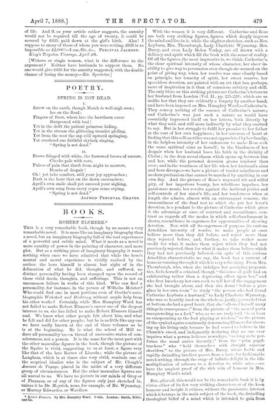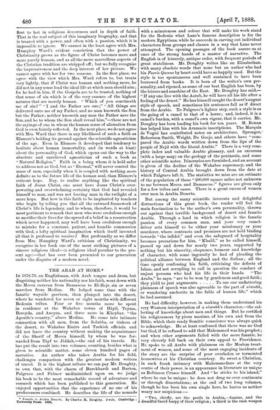BOOKS.
ROBERT ELSMERE.* THIS is a very remarkable book, though by no means a very remarkable novel. It is more like an imaginary biography than a novel, but an imaginary biography full of the real experiences of a powerful and subtle mind. What it needs as a novel is more equality of power in the painting of character, and more plot. But as a striking piece of imaginary biography it wants nothing when once we have admitted that while the hero's mental and moral experience is vividly realised by the author, the hero himself is almost lost sight of in the delineation of what he did, thought, and suffered, no distinct personality having been stamped upon the record of those vivid deeds, thoughts, and sufferings. This is not an uncommon failure in works of this kind. Who can find a personality, for instance, in the person of Wilhelm Meister Who could find one in most portions even of Goethe's auto- biographic Wahrheit und Dichtung, without ample help from his other works ? Certainly, while Mrs. Humphry Ward has not failed to make Robert Elsmere's career one of the deepest interest thus, she has failed to make Robert Elsmere himself real We know what other people felt about him, and what he felt and did for other people; but he is as little like any one we have really known at the end of these volumes as he is at the beginning. He is what the school of Mill re- duce all personality to,—a thread of successive states of con- sciousness, not a person. It is the same for the most part with the other masculine figures in the book, though the picture of the Squire is vivid, suggesting, to us at least, a figure very like that of the late Rector of Lincoln ; while the picture of TAngham, which is at times also very vivid, reminds one of the sceptical idealist who is the subject of Mr. Clough's Amours de Voyage, placed in the midst of a very different group of circumstances. But the other masculine figures are all unreal to us. We have no picture in our minds of Grey or of Flaxman, or of any of the figures only just sketched in, unless it be Dr. Meyrick, none, for example, of Mr. Wynnstay, or Murray Edwardes, or Wardlaw.
* Robert Eisatere. By Mrs. linmphry Ward. 3 vols. London : Smith, Elder, and Co.
1
With the women it is very different. Catherine and Rose are both very striking figures, figures which deeply impress the mind and live in it, while the slighter sketches, such as Mrs. Leyburn, Mrs. Thornburgh, Lady Charlotte Wynustay, Mrs. Darcy, and even Lady Helen -Parley, are all drawn with a delicacy and spirit which fill the book with the sense of reality. Of all the figures, the most impressive is, we think, Catherine's, the clear spiritual intensity of whose character, her sheer in- ability to give way to persuasion even though she seemed on the point of giving way, when her resolve was once clearly based on principle, her tenacity of spirit, her sweet reserve, her speechless devotion, are painted with an art that has, perhaps, more of inspiration in it than of conscious subtlety and skill. The only blots on this striking picture are Catherine's letters to her husband from London (-Vol. II., pp. 225-229), which are so unlike her that they are evidently a forgery by another hand, and have been imposed on Mrs. Humphry Ward as Catherine's. They convey nothing of the essence of Catherine's nature; and Catherine's was just such a nature as would have essentially impressed itself on her letters, both directly by what they said, and still more indirectly by what they omitted to say. But in her struggle to fulfil her promise to her father at the cost of her own happiness ; in her soreness of heart at finding that this self-sacrifice was not appreciated by her family; in the helpless intensity of her endeavour to make Rose seek the same spiritual aims as herself ; in the blankness of her despair when her husband loses his faith in the divinity of Christ; in the deep moral chasm which opens up between him and her, while the personal devotion grows tenderer than ever ; and in the weariness of her life when her husband's aims and hers diverge,—we have a picture of tender saintliness and modern puritanism that cannot be matched by anything in our own day. And the picture of Rose's wayward wit and wilful pity, of her imperious beauty, her rebellious impulses, her passionate music, her revolts against the habitual pieties and self-controls of her sister's life, and her tenderness when at length she admits, almost with an extravagant remorse, the unseemliness of the final test to which she put her lover's devotion, is a pendant to the picture of Catherine which gives it the advantage at once of contrast and resemblance, con- trast as regards all the modes in which self-abandonment is shown, resemblance in eagerness for opportunities of showing devotion. Nor, with all its eagerness of purpose, its curious .Arnoldian intensity of resolve to make people at once believe more than they did before, and reject more than they rejected before, and, further, to take rather more credit for what it makes them reject which they had not previously rejected, than for what it makes them believe which they had not previously believed,—in spite of this curious Arnoldian characteristic, we say, the book has a current of humour running through it which is very refre :hing. From Mrs. Thornburgh, who, when she indulges her gossiping propensi- ties, feels herself a criminal, though " thesense of guilt had an exhilarating rather than a depressing effect upon her," and who first knocks up her own cook to tell her of the engagement
she had brought about, and then sits down "before a pier- glass in her own room" to study "the person who had found Catherine Leyburn a husband," to Lady Charlotte Wynnstay, who was so heartily (and on the whole so justly) persuaded that at bottom she had a good heart, that she "allowed herself many things in consequence ;" from the picture of "the man of parts masquerading as a fool," who, as we are truly told, "is at least as exasperating as the fool playing at wisdom," to the picture of the cynical squire continually denouncing Elsmere for throw- ing up his living only because he had ceased to believe in the Church's creed, and indignantly declaring that no one ever inquires what a person believes nowadays, so long as lie per- forms the usual antics decently ;" from the "prim pupil- teachers" who "hold themselves with straight, superior shoulders," to the picture of Mrs. Darcy, whose feeble and rapidly dwindling intellect passes from a taste for fashionable novel-writing, through the stage of infinite delight in the idle multiplication of arbours, to a devotion to white mice,—we have the amplest proof of the rich vein of humour in Mrs. Humphry Ward's mind.
But, after all, this would not be the remarkable book it is by virtue either of its few very striking characters or of the keen humour and insight it evinces, without the passionate interest which it betrays in the main subject of the book, the dwindling theological belief of a mind which is intended to gain from
first to last in religious devoutness and in depth of faith. That is the real subject of this imaginary biography, and that is treated with a power, and often with a passion, which it is impossible to ignore. We cannot in the least agree with Mrs. Humphry Ward's evident conviction that the power of Christianity grows as the figure of Christ becomes more and more purely human, and as all the more marvellous aspects of the Christian tradition are stripped off; but we fully recognise the impressiveness and the deep interest of her picture. We cannot agree with her for two reasons. In the first place, we agree with the view which Mrs. Ward refers to, but treats very lightly, that if Christ was human and nothing more, he did not in any sense lead the ideal life at which man should aim ; foi he had in him, if the Gospels are to be trusted, nothing of that sense of sin which is of the very essence of the highest natures that are merely human. "Which of you c,onvinceth me of sin?" "I and the Father are one ;" "All things are delivered unto me of my Father, and no man knoweth the Son but the Father; neither knoweth any man the Father save the Son, and he to whom the Son shall reveal him,"—these are not the sayings of one in whom the human sense of alienation from God is even faintly reflected. In the next place, we do not agree with Mrs. Ward that there is any likelihood of such a faith as Elsmere's holding its ground against the scientific agnosticism of the age. Even in Elsmere it developed that tendency to hesitate about human immortality, and (in words at least) about the personality of God, which opens out the way to the absolute and unrelieved agnosticism of such a book as "Natural Religion." Faith in a being whom it is held safer to address not as God, but as "Eternal," will never control the mass of men, especially when it is coupled with nothing more definite as to the future life of the human soul, than Elsmere's reticent hope. Nay, to realise anything like the spiritual faith of Jesus Christ, one must have Jesus Christ's over- powering and overwhelming certainty that God had revealed himself to man, and was not leaving man in the twilight of a mere hope. But how is this faith to be implanted by teachers who begin by telling you that all the outward framework of Christ's life is legendary, and to whom, therefore, it would be most pertinent to remark that men who were credulous enough to sacrifice their lives for the spread of a belief in a resurrection which never happened, may well have been credulous enough to mistake for a constant, patient, and humble communion with God, a lofty spiritual imagination which itself invented all that it professed to receive ? But profoundly as we differ from Mrs. Humphry Ward's criticism of Christianity, we recognise in her book one of the most striking pictures of a sincere religions ideal—(a religious ideal peculiar to the pre- sent age)—that has ever been presented to our generation under the disguise of a modern novel.



































 Previous page
Previous page